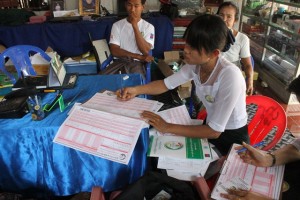Mon Community Suspects Corruption in 2014 Census Reporting
April 22, 2014
Burma’s Mon community holds serious doubts concerning the Burmese government, and its data collection procedures for the country’s 2014 census, conducted from March 30th to April 10th. Ethnic Mon community members are concerned that the government did not cooperate with the local people, and actively worked to diminish Mon representation in census documentation.
Worrying that the government would pervert data concerning the Mon population in Burma, Mon political party leaders urged the Mon civil society to monitor the data collection process of the 2014 census, resulting in conflict between government data collectors and the Mon community.
When data collection began on March 30th, Mon democratic party and civil society groups approached the data collectors to ask for permission to monito r their work; Ma New Aye, the head of data collection, refused their request. The Mon people have requested permission to monitor data collection multiple times, and Ma New Aye continues to refuse them, stating that no one is allowed to observe the data collectors.
r their work; Ma New Aye, the head of data collection, refused their request. The Mon people have requested permission to monitor data collection multiple times, and Ma New Aye continues to refuse them, stating that no one is allowed to observe the data collectors.
On March 31st, Ye Township data collectors instructed residents to omit filling in the ethnicity code box, because they had already identified as ‘Mon’ elsewhere in the form. A resident from Ye City, Mon State, raised his concerns with these instructions, stating he “did not see that they wrote ‘601’, which represents Mon ethnicity, in the code box”.
A Mon literature group in Pa-na Village planned to monitor data collection there as well. On April 2nd, after two days of monitoring, data collector Daw Tin Tin Soe, who is the principle of the Ta Man Oo Kyaung Primary School in Pa-na village, offended members of the Mon group when she asked, “What are you guys going to do, collect about dogs?”.
The group informed Pa-na village administrator, Nai Win Choe, about Daw Tin Tin Soe’s rude comments and refusal to allow the group to monitor Pa-na data collection, but Nai Win Choe also held the view that the Mon group did not have the right to monitor data collection. Consequently, the Mon literature group was not able to monitor data collection in Pa-na Village.
Further conflict arose between local people and data collectors, as some villages were not informed of exact dates of collection, and data collectors did not explain clearly to residents what should be written in the code box to identify Mon ethnicity. Further, data collectors could not speak local languages, which inhibited communication with local residents.
Local people doubted the government even before data collection began for Burma’s 2014 census. When reporting started, data collectors largely refused to cooperate with members of Mon civil society, and did not provide quality service to the local people. The Mon community claims that these actions have generated further distrust of the government, and that they will not accept what the government reports to the world about Burma’s Mon population.
Comments
Got something to say?
You must be logged in to post a comment.



















































